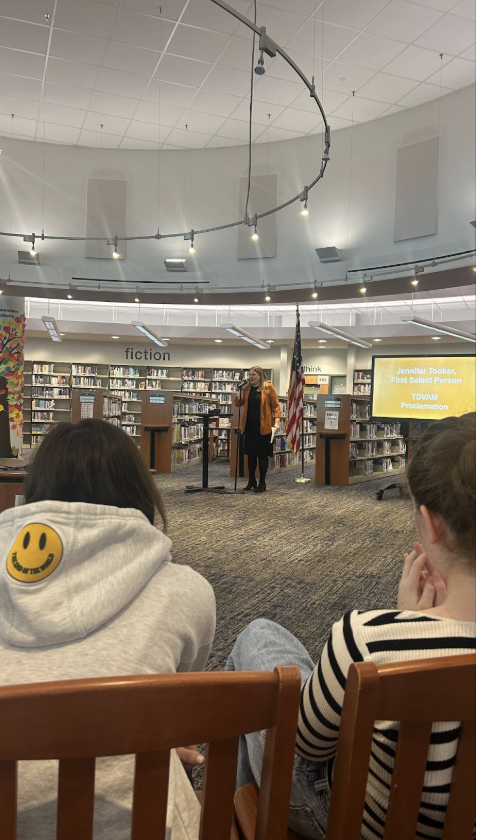When midterms came around this year, Anais Mitra ’14 added another thing to her to-do list: pray. Pray to do well on the exam.
When offered drugs, Alye Pollack ’15, has her response ready: no. No because the Bible instructs that drugs are sinful.
And Sean Driscoll ’15 doesn’t stress when he has to make a tough decision.
“I know I have my religion on my side,” he said.
According to a national study on teenagers and religion, around 71 percent feel some sort of close relationship with God. Informally, a poll done on about 200 Staples students shows that 60 percent believe in God. However, only 35 percent of students pray regularly.
Some Staples students’ religious beliefs are more apparent than others. Amereen Anand ’13 practices Sikhism, a belief originating in northwestern India. A major pillar of this religion is the belief that everything God gives all beings is a gift, so altering is not an option. This includes cutting hair. Anand’s hair, at this point, has grown to about one and half to two feet. She feels proud when people ask about it.
“I like to know other people are interested,” Anand said. Sikhism, she said, keeps her grounded. “It makes me who I am,” she said.
Sometimes, it’s what you don’t see Hamza Khan ’12 doing that represents his religion.
During Ramadan, Khan may choose not to eat lunch. The traditional Islamic holiday requires one to fast for a whole month. So at times, Khan will sit in the lunchroom, at a table with his friends who are eating everything from pasta to paninis, and he eats nothing. However, describing himself as not being that observant, Khan said he sometimes chooses to ignore the dictates of his religion and eat lunch anyways.
Hamza said that living in an area like Westport has a large impact on how religious he is.
Instead of doing the usual five prayers a day, which he might do if he lived a predominantly Islamic country, Khan might only pray once in the morning, and once at night.
“Over here I’m not that religious, probably because I’m surrounded by people who aren’t that religious and I just wanted to fit in,” he said.
Similar to Hamza, Shweta Lawande ’12, who is Hindu, has molded the traditional beliefs of her faith to what she calls a “hybrid religion.” She was raised in the United States and has traveled quite a bit. Seeing all the different cultures led her to her own conclusion.
“I don’t think people really understand how similar all these religions are,” said Lawande. “Truly all the religions I’ve ever come in contact with, whether it’s Hinduism, Christianity, Judaism, Islam…etc. all preach goodness.” Lawande says she believes in treating others the way you want to be treated.
This approach to religion is similar to that of many Staples students, who describe religion as more of a morality that helps them live their lives.
“I believe that God and religion are two different things. My personal relationship with my idea of God has helped define me,” Jake Landau’13 says, “but it is the traditions inherent in my Jewish religion that serve as a significant portion of my moral compass.”
Religion provides inner guidance, students said, such as deciding whether or not to do drugs, cheat on a test, or have sex.
Nick Massoud ’15 commented that religion is pretty important in his life in just this way.
“I try to help other people because I believe that if you are good to others, good things will also happen to you,” Massoud said.
Some students don’t want to be associated with their personal beliefs.
A few students are afraid they might come off as, as one student put it, “some super religious freak.”
Rev. Alida Ward of Greenfield Hill Congregational Church in Fairfield, Conn. believes that this is pretty common among teenagers, especially here in Fairfield County.
“We live in an area where people don’t talk about religion, and that’s not just kids, but adults as well,” Rev. Ward said. “We don’t practice talking about it.”
However, she said kids are more affected by religion that they realize.
A 17-year-old “tough guy football player” told Rev. Alida, in her words, “the ultimate teenage statement”: he doesn’t believe in God, but he talks to God all the time.
Some high schoolers feel so private about their religion perhaps because Staples is a public high school and is non-denominational. Students are not surrounded with a certain belief, like in a Catholic or Jewish school.
“We are a school that represents all,” said Ms. Gayanilo, a social studies teacher.
It gives the student a sense of belonging, she added.
Staples has policies that guide teachers in how to go about approaching religion in the classroom, preventing them from making any student feel left out.
“Our job is to inform the student,” said James D’Amico, social studies department chair, “but we can never advocate for a particular religion.”













































